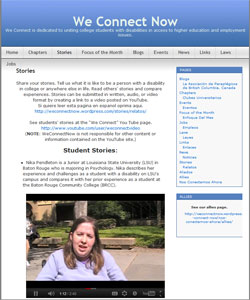by Bob Glowacki
With tax day drawing near, I found a story in MyHealthNews Daily particularly disturbing — it’s about the financial challenges faced by families affected by autism.
The story shared the results of a study based on yearly surveys of U.S. households conducted between 2002 and 2008. It included 64,349 families with healthy children, 2,921 families of children with other health limitations and 261 families of children with autism.
On average, mothers of autistic children earn $14,755 less per year than mothers of healthy children, and $7,189 less per year than mothers of children with other health conditions (such as asthma and ADHD) that limit their ability to engage in childhood activities.
From the article: “Having a child with autism may limit the parents’ abilities to work because these children require more care. Finding quality, specialized childcare for autistic children may be difficult and costly, the researchers say.”
While fathers’ salaries by themselves were not affected by having a child with autism, the study showed that total family income was affected: on average, families with autistic children earned $17,763 less than other families, and $10,416 less than families with children with other health limitations.
The median American family income in 2010 was around $51,000, which means having a child with autism can mean a huge loss in earning potential and financial security for hundreds of thousands of families in the United States.
I have seen firsthand what can happen to families struggling to find services for their children. Before Wisconsin mandated health insurance coverage for children with autism, one family whose child served as the child representative for Easter Seals Southeast Wisconsin told me they had taken out a second mortgage on their home to finance autism services. Sadly, the Wisconsin mandate covers only half of employers in the state of Wisconsin. There is a glaring lack of respite, daycare options and other supports for families raising children with autism. Respite is a vital need to support and nurture families, strengthen marriages and balance responsibilities. I am only the messenger, but I wish I could say that this new report brought better news.
Easter Seals has prepared a state-of-the-states report on autism services that is a comprehensive and objective resource on how the fifty states, District of Columbia and Puerto Rico are responding to the needs of individuals living with autism spectrum disorders, including the 23 states that have passed autism insurance legislation. The profiles highlight the number of children with autism who have received the state’s special education services, state insurance coverage for autism if available, Medicaid services specific for individuals with autism, educational programs provided to students with autism or training that focused on autism, special education criteria, other state-led resources, and sponsors of autism legislation. I encourage you to give our State Autism Profiles a look. The profiles are a very helpful resource when you’re thinking about making important decisions for your family.
 An email from a woman named Gabriela McCall Delgado alerted us to a very cool web site I’d like to share with you here — the We Connect Now website was created by Gabriela in 2008 with a $1,000 grant from YP4.
An email from a woman named Gabriela McCall Delgado alerted us to a very cool web site I’d like to share with you here — the We Connect Now website was created by Gabriela in 2008 with a $1,000 grant from YP4.







 I’m the Senior Vice President of Government Relations at the Office of Public Affairs at the Easter Seals Washington, D.C. office. I’m so pleased to be asked to be one of the guest bloggers on our new revamped Easter Seals blog.
I’m the Senior Vice President of Government Relations at the Office of Public Affairs at the Easter Seals Washington, D.C. office. I’m so pleased to be asked to be one of the guest bloggers on our new revamped Easter Seals blog. I just returned from China, where I had the opportunity to spend time with and learn from the autism service and support community in Anshan. The opportunity to work internationally is a wonderful component of my job here at Easter Seals — I learn so much from working in other cultures.
I just returned from China, where I had the opportunity to spend time with and learn from the autism service and support community in Anshan. The opportunity to work internationally is a wonderful component of my job here at Easter Seals — I learn so much from working in other cultures. Early spring is such an exciting time for Easter Seals! With autism awareness month around the corner, media is buzzing and things are in full bloom here at headquarters!
Early spring is such an exciting time for Easter Seals! With autism awareness month around the corner, media is buzzing and things are in full bloom here at headquarters!